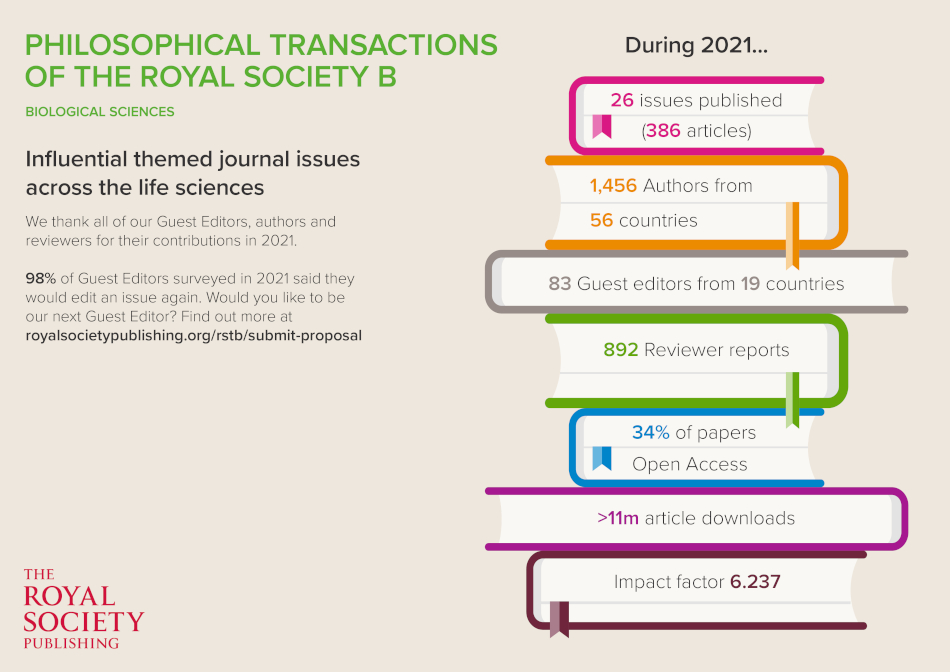Helen Eaton, Senior Commissioning Editor for Philosophical Transactions B, introduces us to the journal's most influential theme issues from the past two years.

At the start of each year, we like to look at some of the highlights from our theme issue programme. Below, we highlight a few of the diverse topics that we have covered in the last two years. They have all been influential or highly read, for varying reasons. We hope that readers will find something to attract their interest!
We are always looking for new topics – if you have an idea and are interested in becoming a Guest Editor, please visit this page to find out more. We welcome proposals from researchers in any area of the life sciences, working anywhere in the world.
Climate change and ecosystems: threats, opportunities and solutions
Edited by Janet Franklin, Yadvinder Malhi, Nathalie Seddon, Martin Solan, Chris Field, Nancy Knowlton and Monica Turner
This issue covers an important and topical subject area, discussing practical “nature-based solutions” for the mitigation of climate change. This issue arose out of a joint Royal Society/National Academy of Sciences meeting held in November 2018. One of the articles in this issue, Seddon et al. ‘Understanding the value and limits of nature-based solutions to climate change and other global challenges’, is currently our top-cited article in this time period. The Introductory article has also been very highly downloaded.
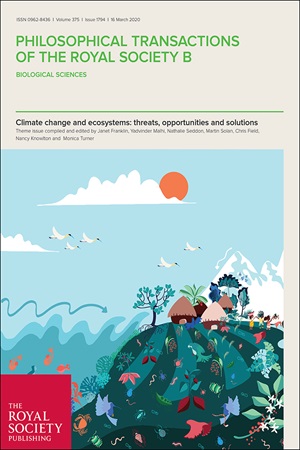
Modelling that shaped the early COVID-19 pandemic response in the UK
Edited by Ellen Brooks-Pollock, Leon Danon, Thibaut Jombart and Lorenzo Pellis
COVID-19 is one of the biggest challenges the world has faced in recent times. Infectious disease modelling, or the study of epidemics, was an integral part of the scientific evidence used to guide the COVID-19 response in the UK. This fully Open Access theme issue, published in May 2021, documents work that was presented to the Scientific Advisory Group for Emergencies (SAGE) modelling subgroup, known as SPI-M (Scientific Pandemic Influenza Group on Modelling) between January and July 2020, during which the UK experienced a rapid rise in COVID-19 cases and the first national stay-at-home order. This issue provides insight into the knowns, unknowns, and often complex trade-offs involved in understanding and controlling an infectious disease (read the Introduction for a fascinating overview).
The political brain: neurocognitive and computational mechanisms
Edited by Leor Zmigrod and Manos Tsakiris
At a time of significant ideological polarisation and widespread misinformation, there is an urgent need to understand the psychological roots and consequences of political behaviour. This theme issue brought together research at the intersection between neuroscience, computational cognitive science, and the study of socio-political attitudes, in order to elucidate the neurocognitive mechanisms that underpin ideological behaviour. One article, Zmigrod et al. ‘The cognitive and perceptual correlates of ideological attitudes: a data-driven approach’ is one of the top-downloaded papers from last year. Read more about this issue in an interview with the Guest Editors.
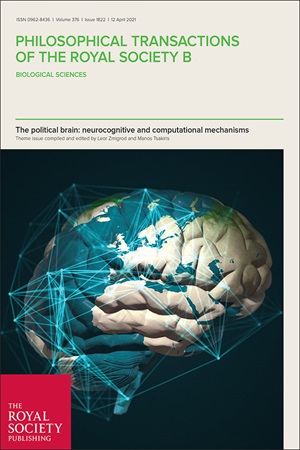
Conceptual challenges in microbial community ecology
Edited by James I. Prosser and Jennifer B.H. Martiny
Microorganisms play fundamental roles in environments from the human gut to the open ocean. This wide-ranging issue looks at the latest research but also tackles the challenges of how research in this field should be done. Technology now allows us to catalogue the enormous diversity of microorganisms in samples, but a new challenge is to interpret these data by placing them into larger conceptual frameworks. An article by one of the Guest Editors, Professor James Prosser FRS, provides a starting point to think about this: ‘Putting science back into microbial ecology: a question of approach’.
Multidisciplinary perspectives on social support and maternal–child health
Edited by Abigail E. Page, Emily H. Emmott and Sarah Myers
This issue again tackled questions that were very relevant to life in the pandemic. It is widely acknowledged that women with children require high levels of social support to promote their, and their children’s, health and wellbeing. Globally, social support systems are complex, coming in different forms and from different sources, influenced by environmental context. This issue explores social support from different perspectives to deepen our understanding of social support and its consequences for mothers and children. Read more about the background to the issue in this blog post by one of the Guest Editors.
Olfactory communication in humans
Edited by S. Craig Roberts, Jan HavlíÄek and Benoist Schaal
Odours regulate critical social processes in animals, but it has long been considered that the human sense of smell is relatively ineffectual. This theme issue reflected a growing realisation that this view is incorrect and highlights the important role of human smell in social assessment and behaviour. One paper by Perl et al. proved extremely timely, publishing at the start of the COVID-19 pandemic when concerns about face-touching were prevalent: 'Are humans constantly but subconsciously smelling themselves?'
Impacts of the 2018 severe drought and heatwave in Europe: from site to continental scale
Edited by Wouter Peters, Ana Bastos, Philippe Ciais, Alex Vermeulen and Werner Kutsch
The summer drought that hit central and northern Europe in 2018 had severe impacts on crops, forests, and grasslands. This theme issue brought together researchers working on different scales to report on the impacts found, and what can be learnt from this. This issue highlights the importance of large-scale ecological monitoring across countries.
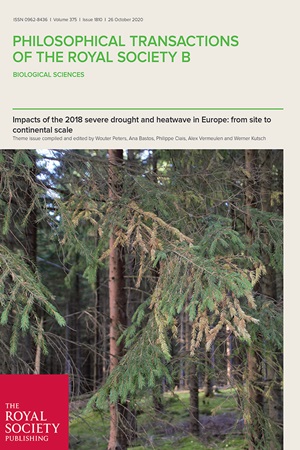
Fifty years of sperm competition
Edited by Leigh W. Simmons and Nina Wedell
This issue celebrated a key anniversary in a major research field in evolutionary biology. Charles Darwin recognised that competition for mates favours the evolution of exaggerated secondary sexual traits, such as the iconic peacock’s train or elk antlers, however Darwin thought that competition ceased after mating. 50 years ago, Geoff Parker recognised that because females of most species will mate with more than one male, competition continues between the ejaculates of different males.
The language of cooperation: reputation and honest signalling
Edited by Szabolcs Számadó, Daniel Balliet, Francesca Giardini, Eleanor A. Power and Károly Takács
This theme issue looked at common themes within our own lives, asking fascinating questions about cooperation, gossip, and reputation.
Cross-disciplinary approaches to prehistoric demography
Edited by Jennifer C. French, Philip Riris, Javier Fernandéz-López de Pablo, Sergi Lozano and Fabio Silva
Recent advances in the reconstruction and interpretation of prehistoric population histories have been transforming our understanding of past societies. This theme issue integrated the efforts of researchers working across archaeology, anthropology, genomics, palaeoecology, and evolutionary demography, to provide a benchmark for the state-of-the-art in prehistoric demography and a statement of the future of this rapidly growing cross-disciplinary endeavour.
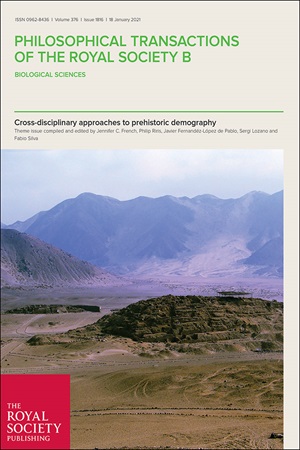
Visit our website to browse all issues.

